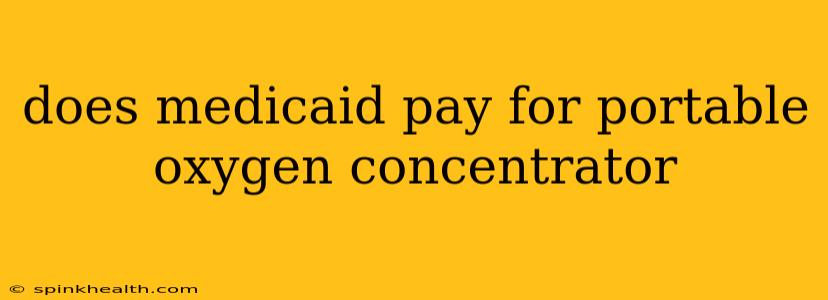Does Medicaid Pay for a Portable Oxygen Concentrator? The Long and Winding Road to Respiratory Relief
The short answer is: maybe. Whether Medicaid pays for a portable oxygen concentrator (POC) depends on several factors, making it a journey rather than a simple yes or no. This isn't a straightforward "one-size-fits-all" situation, and navigating the system can feel like trekking through a maze. Let's unravel this together.
My own experience with navigating the healthcare system for a loved one highlighted just how complicated this can be. It took countless phone calls, forms, and a healthy dose of persistence. This post aims to guide you through the process, armed with the knowledge gleaned from that personal experience and backed up by research.
What Factors Determine Medicaid Coverage for a Portable Oxygen Concentrator?
Several key factors influence whether your state's Medicaid program will cover a POC. These include:
-
Medical Necessity: This is the biggest hurdle. Your doctor must thoroughly document the medical necessity of a POC for your specific condition. This involves demonstrating that you need supplemental oxygen, that a POC is the most appropriate and effective method of oxygen delivery for your lifestyle, and that it will improve your quality of life and health outcomes. A simple prescription isn't enough; a detailed explanation is crucial.
-
State Medicaid Program Variations: Medicaid is a federal and state partnership, meaning each state administers its program differently. Coverage policies, including those for durable medical equipment (DME) like POCs, can vary significantly from state to state. What's covered in one state might not be covered in another.
-
Specific POC Model: Medicaid may not cover all POC models. They often have preferred provider lists or specific criteria for the types of equipment they will reimburse. You may need to work with your doctor and your Medicaid provider to find a POC that meets their requirements.
-
Prior Authorization: In many cases, you will need to obtain prior authorization from your Medicaid program before purchasing a POC. This involves submitting documentation supporting the medical necessity and often takes time. Be prepared for delays and follow up diligently.
-
Your Individual Needs: Your individual health status, lifestyle, and medical history all play a role. If your condition fluctuates or requires different oxygen levels, this will need to be clearly documented.
How Can I Increase My Chances of Medicaid Coverage?
-
Thorough Medical Documentation: This is paramount. Work closely with your doctor to ensure they provide comprehensive medical documentation supporting the necessity of a POC. This should include details about your diagnosis, the severity of your condition, and how a POC will improve your overall health and quality of life.
-
Understand Your State's Medicaid Guidelines: Contact your state's Medicaid agency directly. Their website should outline coverage guidelines for DME, and contacting them directly will provide the most accurate and up-to-date information.
-
Appeal If Denied: If your initial application is denied, don't give up. Understand the reasons for the denial and gather any additional evidence needed to support your appeal. The appeals process can be lengthy, so be patient and persistent.
-
Explore Other Options: If Medicaid doesn't cover a POC, explore alternative options such as Medicare, private insurance, or patient assistance programs offered by manufacturers.
What Are Some Alternatives to Medicaid for Covering a Portable Oxygen Concentrator?
-
Medicare: If you are eligible for Medicare, it may cover a POC, but it's subject to similar criteria regarding medical necessity. You'll still need thorough documentation from your physician.
-
Private Insurance: Check with your private insurance provider to see if they cover POCs. Their coverage policies will vary.
-
Manufacturer Patient Assistance Programs: Some manufacturers of POCs offer patient assistance programs to help individuals afford their equipment. Check with the manufacturers' websites for information.
Will Medicaid Pay for Oxygen Supplies With a Portable Oxygen Concentrator?
Medicaid's coverage of oxygen supplies (like cannulas and tubing) used with your POC is likely handled separately but is often covered if the POC itself is approved. Again, ensure you check with your state Medicaid agency for specific details.
Navigating Medicaid can be daunting, but with persistence and proper preparation, you can significantly increase your chances of obtaining coverage for a portable oxygen concentrator. Remember, thorough documentation and a strong working relationship with your doctor are key to success. Don't hesitate to advocate for your needs and seek help if you need it. You're not alone in this journey.

